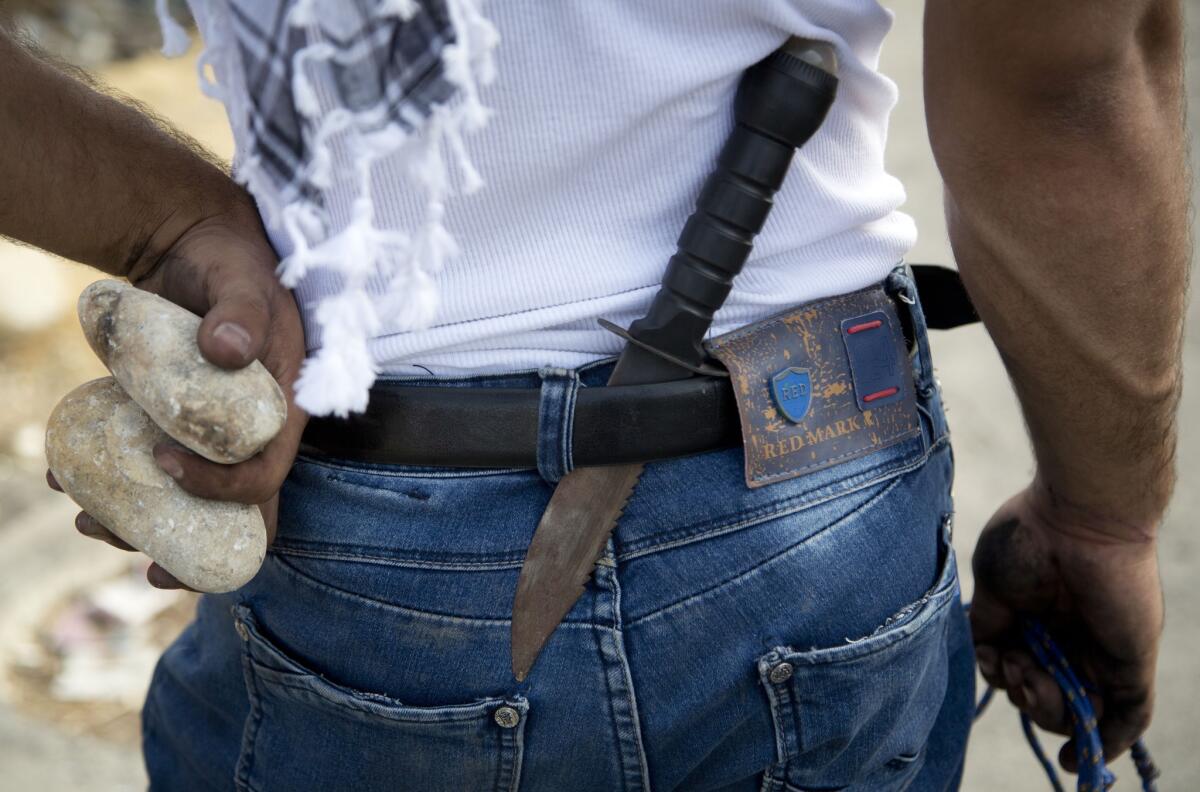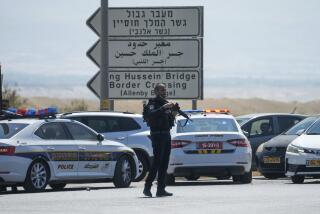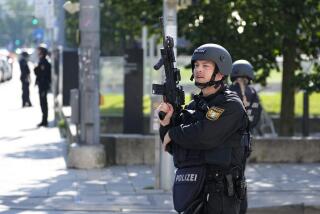Man opens fire in crowded bus station in Israel; 1 killed, 9 injured

A Palestinian demonstrator has a knife in his belt and rocks in his hand during clashes with Israeli troops, near Ramallah, West Bank, on Sunday.
- Share via
Reporting from Jerusalem — A man armed with a handgun and a knife attacked travelers in a crowded bus station in the southern Israeli city of Beersheba on Sunday evening, leaving one person dead and nine others injured, authorities said, as violence continued to roil the region.
According to Yoram Halevy, police commander of Israel’s southern district, the assailant entered the closed and guarded complex that houses the city’s central bus station as well as shops and restaurants, and fatally shot a soldier. Grabbing the automatic rifle from his victim, the assailant continued the shooting rampage with both weapons, injuring both civilians and policemen. The attacker eventually was also killed.
Two victims arrived at Soroka hospital in critical condition, Gadi Shaked, head of the trauma unit, told Israeli television. Seven others, including four police officers, were treated for gunshot wounds.
Among the more seriously injured was an Eritrean man apparently mistaken for a terrorist. He was shot by a guard and then beaten by an angry mob, authorities said.
A recording circulated by the police showed the shattered glass windows of the mall and bloodstains under the bus terminal’s rows of adjoining orange plastic chairs.
Sunday evening is an especially busy time as soldiers, university students and others return from the weekend.
The complex was evacuated after the attack as security forces searched the building as well as nearby areas for others who may been involved. Roadblocks were deployed at city exits after witnesses reported seeing a car speed away from the scene.
As a group of angry citizens gathered outside the building and shouted anti-Arab slogans for television cameras, Beersheba Mayor Ruvik Danilovich cautioned residents against taking the law into their hands.
He urged them to refrain from making generalized accusations in the diverse city.
“Hours such as these command restraint and calm,” he said, while acknowledging “a new reality.”
Sunday’s attack marked a change from the pattern of most of the recent assaults against Israelis. Attacks in the last few weeks generally have been carried out by lone, young Palestinians wielding just knives, though in one recent incident in Jerusalem, two assailants took over a bus with a handgun and knife and killed two Israelis.
Additional security measures were implemented Sunday in Jerusalem, where concrete slabs were being installed as a temporary security barrier at the edge of the Jewish neighborhood of Armon Hanatziv, where residents have complained of firebomb and rock attacks against their homes from the neighboring Palestinian village of Jabal Mukaber.
Jerusalem remained tense but calm as Prime Minister Benjamin Netanyahu convened his Cabinet, which has advanced tighter legislation to counter the spate of Palestinian knifings and other attacks. If approved in parliament, police would have expanded stop-and-frisk authority and be allowed to search for weapons on any person in a declared “violence-prone” location. At present, police can do so only if they have reasonable cause for suspicion.
Meanwhile, U.S. Secretary of State John F. Kerry said in Paris on Sunday that he would meet with Israeli Prime Minister Benjamin Netanyahu in Germany in coming days to discuss the latest violent eruption of the Israeli-Palestinian conflict. The meeting is expected to take place Wednesday or Thursday in Berlin, where Netanyahu will be holding a state visit he postponed this month as the situation deteriorated.
Kerry is also expected to meet with Palestinian Authority President Mahmoud Abbas and Jordan’s King Abdullah II in the Middle East, possibly in Jordan.
As the U.S. appeared ready to step up diplomatic efforts to defuse tensions around the Jerusalem holy site that houses the Al Aqsa mosque and that Jews revere as the Temple Mount, Netanyahu firmly rejected a reported French proposal for international observers at the compound that would call for its “internationalization.”
“Israel will protect the holy sites, will guard the status quo,” said Netanyahu, adding that Israel was “not the problem on the Temple Mount” but the solution.
A reminder of the explosive role of religion in the conflict came overnight as 30 Jews violated standing instructions from Israel’s military and entered the West Bank city of Nablus to visit the site of Joseph’s Tomb, a Jewish holy site under Palestinian control, parts of which were damaged by fire the night before.
Palestinian security services blocked the Jews from entering and coordinated with Israel’s military to extricate them from an angry crowd. Israeli soldiers detained five of the violators, who were later placed under house arrest.
Sobelman is a special correspondent.
ALSO
Pentagon says airstrike kills Al Qaeda operative in Syria
For those left in Syria, life among the ruins takes on a ghostly air
Abbas denounces Palestinian firebombing of Joseph’s tomb in West Bank
More to Read
Sign up for Essential California
The most important California stories and recommendations in your inbox every morning.
You may occasionally receive promotional content from the Los Angeles Times.










